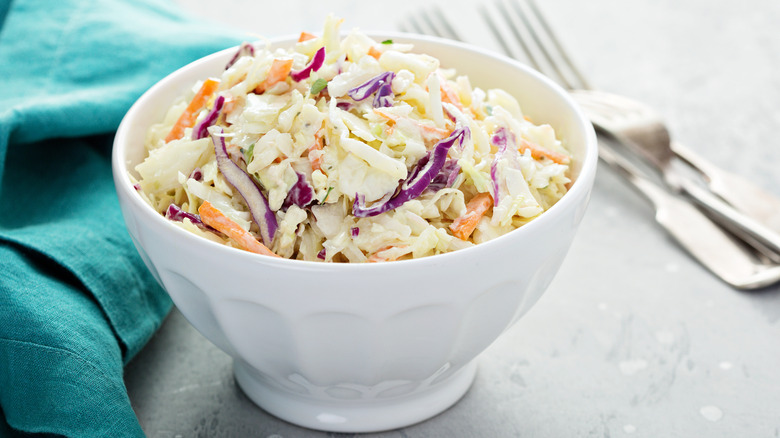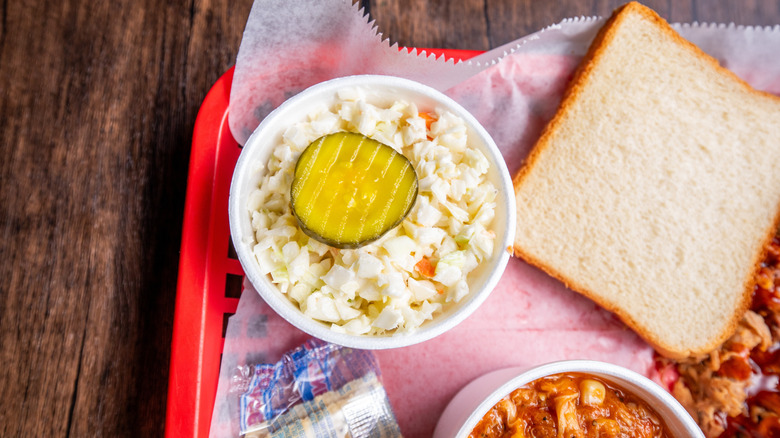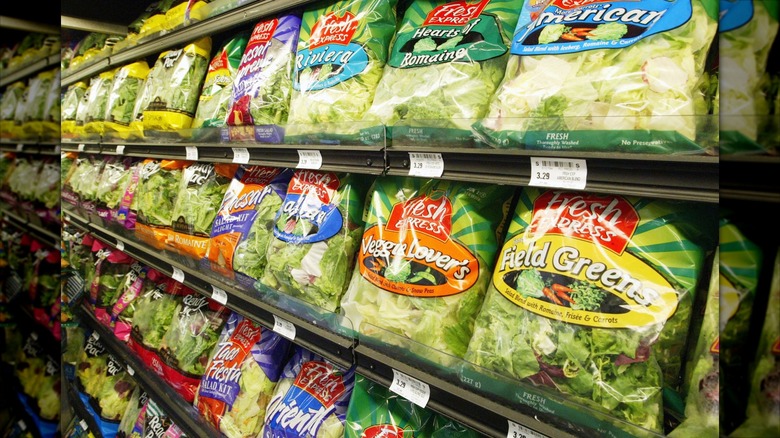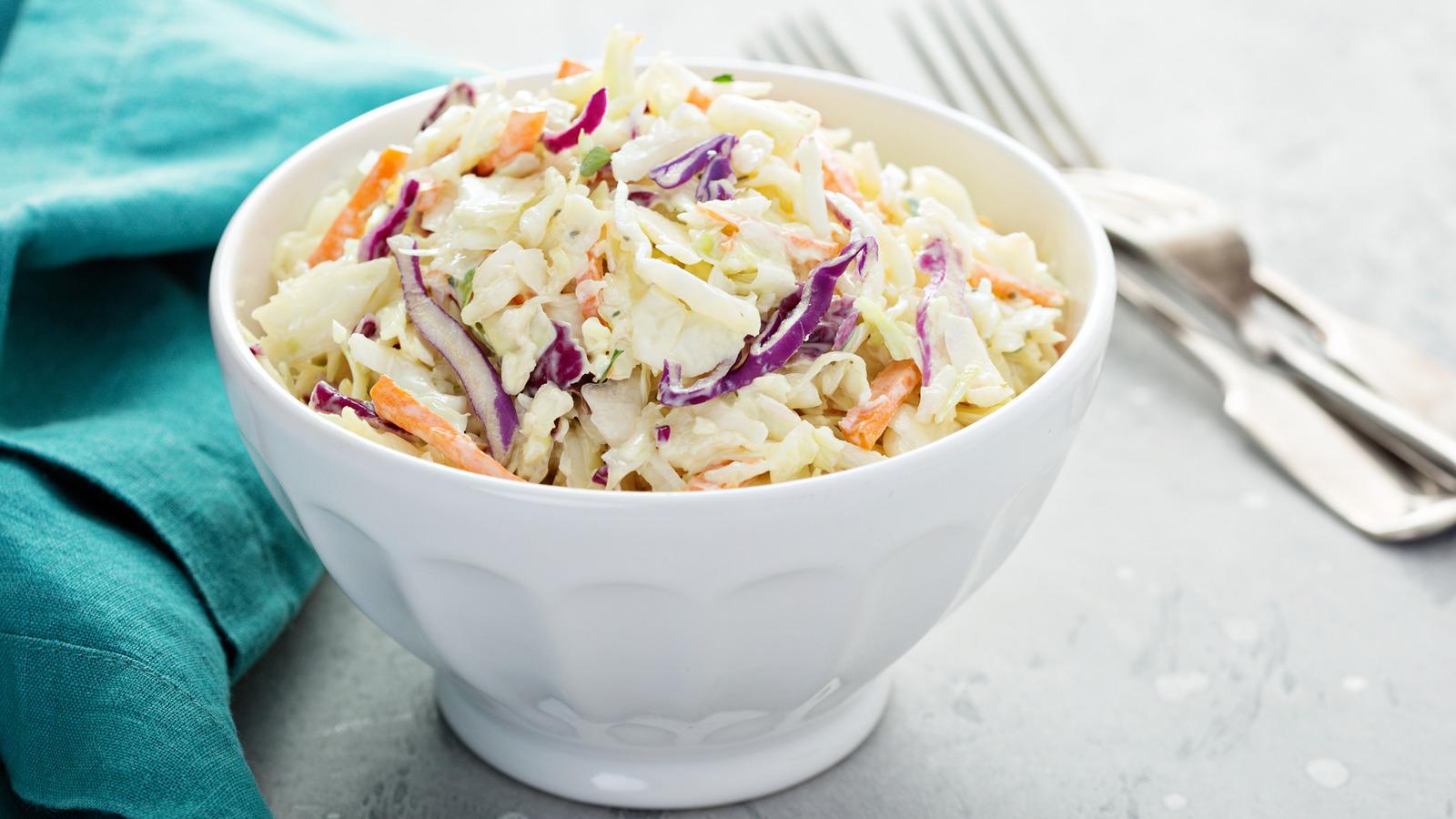
Veselovaelena/Getty Images
Love it or hate it, coleslaw is a popular side dish at restaurants, cookouts, and picnics. It's simple enough to whip up a traditional coleslaw recipe on your own, but there are plenty of store-bought brands out there if you prefer a more convenient alternative. Like all manufactured foods, proper care and oversight during processing ensures a quality finished product, but even trusted companies can encounter food safety issues. And when these issues aren't caught in time and pose a risk to consumers, a recall will likely follow.
We wanted to learn more about coleslaw recalls and their impact on U.S. consumers, and we uncovered three incidents that highlight the importance of food safety at commercial manufacturing facilities. In one instance, a seafood-based wholesale company encountered problems with its mislabeled coleslaw, while popular brands Dole and Fresh Express enacted recalls over suspected contamination of their respective bagged coleslaws, among other products. It might seem like food recalls are occurring more frequently these days, but the truth is that the rate of recalls is largely the same. Also, it's likely that improved testing and quality-assurance processes detect issues that might have gone unnoticed in previous years.
Washington Crab

BrittanyD/Shutterstock
In 2023, North Carolina-based company Washington Crab issued a recall of select packages of coleslaw, crab cakes, cocktail sauce, and crab dip after the company determined that the products contain unlisted allergens. Specifically, product labeling failed to disclose the presence of wheat, milk, fish, egg, and soy. These ingredients are included among the nine major food allergens that the FDA requires companies to list on their packaging, along with peanuts, tree nuts, and crustacean shellfish (the Biden administration added sesame to the list of major allergens in 2021).
The recalled products were disseminated throughout North and South Carolina. Washington Crab distributed some of the mislabeled products through its own retail outlet, but it also provided the affected items to restaurants and food distributors. There's not much information available about the scope of the recall or if anyone was harmed by the labeling error. The effects of food allergies range from mild to severe, and serious complications like anaphylaxis can be life-threatening. However, the absence of injury reports hopefully indicates that no major health issues resulted from Washington Crab's labeling oversight.
Dole
Included among the biggest recalls in Dole history, the iconic fruit brand enacted a massive recall of packaged salads in 2021, including several varieties of coleslaw, due to Listeria contamination. Some of these items were distributed under the Dole banner, while others were provided to retailers like Lidl and Kroger, which sold the goods under their own private labels. The contamination was first identified by random sample testing performed in Dole processing facilities in Arizona and North Carolina. When samples testes positive for Listeria, Dole implemented the recall.
The contaminated products made their way to 25 states, including Wisconsin, Texas, North Dakota, Indiana, Illinois, Iowa, Florida, Arizona, Virginia, Tennessee, South Carolina, Pennsylvania, Ohio, New York, North Carolina, Mississippi, Michigan, Maryland, Massachusetts, Louisiana, Kentucky, Georgia, Florida, Connecticut, and Alabama. It's unclear if any consumers were harmed by the items linked to this specific recall, but the FDA cited the strain of Listeria discovered in Dole's products as contributing to 16 bouts of food-borne illness since 2014. Listeria infections can cause diarrhea, vomiting, and abdominal distress, but these symptoms usually resolve within days. Some individuals, however — including pregnant people, infants and young children, and older adults — may face more serious complications.
Fresh Express

Justin Sullivan/Getty Images
While the FDA allows a limited amount of insect pieces to be present in food, certain creepy-crawlies can pose serious risks to consumers' health. In 2020, Fresh Express learned this the hard way when multiple varieties of its bagged salad, including coleslaw, were found to contain microscopic cyclospora parasites. Ultimately, 641 people fell ill and 37 were hospitalized after consuming recalled items. The contaminated products were distributed to 31 states, plus the District of Columbia. Along with being sold under the Fresh Express label, items were also distributed to major retailers including Aldi and Walmart, among others.
It doesn't appear that Fresh Express ever disclosed how the contamination occurred, but cyclospora parasites can infiltrate fruit and vegetables that are exposed to contaminated water. All the items included in the recall contained carrots, iceberg lettuce, and red cabbage, so it's likely that one or more of these vegetables were responsible for the outbreak. Additionally, only items processed at Fresh Express' Streamwood, Illinois manufacturing plant were involved in the recall. Cyclosporiasis, the infection caused by cyclospora parasites, can result in diarrhea, stomach upset, and low-grade fever. This infection can be effectively managed, but lack of treatment can lead to more serious, long-term health issues.



